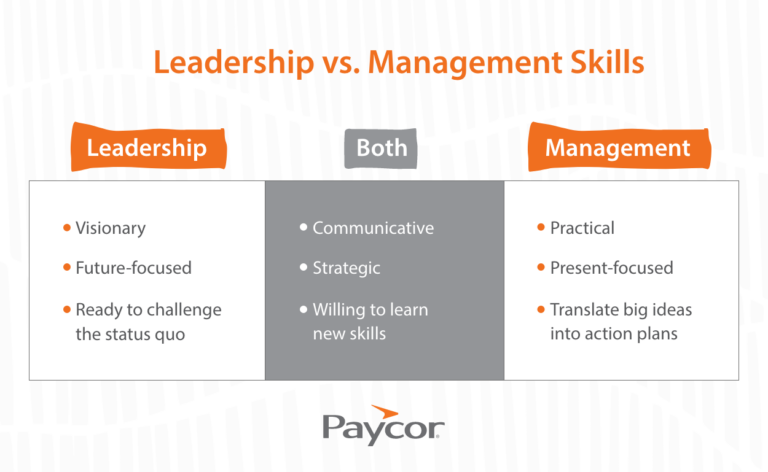Are you a leader or a manager? They might sound similar, but there are some key differences between leadership and management. Some people have innate leadership or management skills, but anyone can learn how to build a winning team.
Remember, it takes all kinds of skills to achieve success. Companies need strong leaders and managers, and not everyone can do both. In this resource, we’ll explore the key qualities of leaders and managers, why their work matters, and how to find your personal style.
Leadership: The Why Behind the What
Leaders are big-picture thinkers. They’re always asking, “What else can we do, and why does it matter?” They’re often executives, department heads, or small business owners. There are several kinds of leadership, and each one sets a different tone for company culture.
Effective leaders inspire their teams to achieve results. Leaders need strong interpersonal skills, and they tend to think strategically. If you’re a natural leader, you might look forward to creative exercises like writing a company’s mission statement.
Great leaders often challenge the status quo. Depending on the person, that could mean fighting for a political goal, introducing a new type of technology, or something else entirely. But the most effective leaders aren’t disruptors for the sake of disruption. Instead, they’re willing to think outside the box in service of a greater vision.
While leaders excel at coming up with big ideas, they often need help with implementation. And without a team of managers and frontline workers, who would they lead?
Management: Putting Great Ideas into Practice
An effective manager is always asking, “How can we accomplish this goal?” They take a practical approach to projects, defining realistic steps that will move the team forward. Good managers are focused, organized, and communicative. Great managers are also strategic. They know how to set short- and long-term goals, measure results, and keep everyone on track.
On an organizational level, managers serve as conduits between frontline workers and high-level executives. It’s their job to translate grand ideas into achievable action plans. Managers set clear expectations, provide regular feedback, and make changes as needed. They also hold team members accountable for their actions, even when it means having hard conversations.
Middle managers are the backbone of most organizations, especially larger companies. Executives trust them to implement the company’s strategy so the C-suite has time to focus on the big picture. Frontline workers, on the other hand, rely on managers for direction. Managers are responsible for creating a culture of feedback, driving engagement, and ensuring each team meets their goals.
Similarities and Differences Between Leader vs. Manager
Both leaders and managers know how to take the helm. They understand the company’s overarching goals, whether they defined those goals or not. They have strong communication skills, and they understand the value of their team.
Despite the overlap in these roles, it’s rare to find one person who can easily do both. In most organizations, leaders and managers work together to support their employees. Doing this requires that everyone on the team understands their own strengths.

How Leaders and Managers Drive Business Results
Both leaders and managers drive success. A wealth of data shows that nothing motivates employees more than a great boss. Paycor’s recent survey on the state of HR found a strong association between profitability and effective leadership. Among companies with excellent performance, 83% agreed their leaders were highly effective.
The best leaders and managers have at least one thing in common: they know there’s always more to learn. Even if you’re at the top of your industry, the nature of work is changing. Between technological innovations, cultural shifts, and global economic trends, it takes more and more effort to keep up. Supporting your team is just the baseline.
Whether you’re an experienced manager, a brand new leader, or somewhere in between, you can always develop your leadership skills. That’s where Paycor comes in.
Leadership and Management Development
Paycor’s COR Leadership Framework combines three of our most powerful tools, empowering leaders and managers at every level.
The COR Leadership Dashboard gives you real-time insights into employee engagement, satisfaction, and other important trends. Paycor Pulse surveys let leaders and managers collect robust data from the team in an anonymous, psychologically safe environment. Then, you can use that data to customize your journey in Paycor Paths, our leadership development tool.










